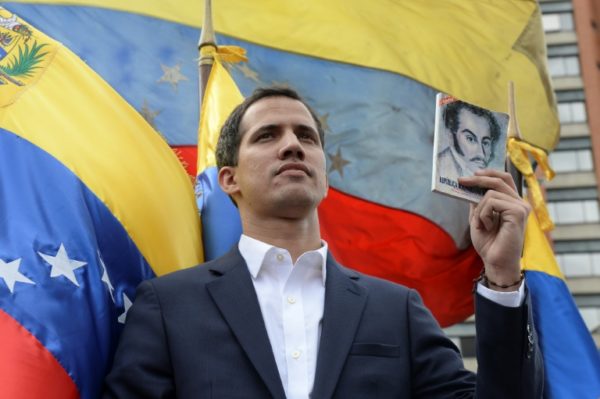


Venezuela’s Supreme Court called Monday for Juan Guaido to be stripped of his legislative immunity.
Earlier, the nation’s authorities announced a ban on him holding public office.
Recognized as Venezuela’s interim president by some 50 countries, Guaido is enmeshed in a power struggle with President Nicolas Maduro.
Neighbouring states as well as superpowers such as the US and Russia ar now taking sides.
As the political battle plays out, the country has been hit by a series of devastating blackouts that have left millions without water, prompting the government to replace the country’s energy minister and institute power rationing in a bid to address the outages.
The decision by the Supreme Court — which is controlled by Maduro loyalists — to call on the ruling Constituent Assembly legislature to strip Guaido of his immunity could open the way for the opposition chief to be prosecuted.
The court ruling cited Guaido’s violation of a ban on his travel outside Venezuela when he visited Argentina, Brazil, Colombia, Ecuador and Paraguay from late February to early March.
The move came after Venezuela’s auditor general’s office announced Thursday that it had stripped Guaido of the right to hold public office for 15 years, a decision he rejected as invalid.
Three major blackouts hit Venezuela in March, worsening already dire living and economic conditions in the country, and prompting authorities to take steps aimed at curbing the outages.
Maduro — whose government has blamed “terrorists” for alleged attacks that have damaged the country’s main hydroelectric power plant — announced that he was Igor Gavidia Leon to replace retired general Luis Motta Dominguez as energy minister.
The new minister “is an electrical industry worker with 25 years of experience, an engineer who had many responsibilities,” Maduro said.
On Sunday, Maduro announced 30 days of electricity rationing, after his government said it was shortening the workday and keeping schools closed due to blackouts.
The measures are a stark admission by the government that there is not enough electricity to go around, and that the power crisis is here to stay.
With no electricity, pumping stations can’t work, so water service is limited.
Street lights and traffic lights go dark, pumps at fuel stations stand idle, and cell phone and internet service is non-existent.
But people try to find water wherever they can: from springs, leaky pipes, gutters, government-provided tankers and the little that flows through the Guiare River in Caracas.
“We fill up from a well near here but we don’t know if its drinkable. But we’re using it,” said Erimar Vale, who lives in the capital.
Post Views: 72

You may be interested

Arsenal Equal Chelsea’s London Derby Feat After 5-1 Win Vs Palace
Webby - December 21, 2024Arsenal equaled Chelsea’s London derby achievement following their 5-1 win against Crystal Palace in Saturday’s Premier League game at Selhurst…

Haaland Backs Guardiola To Turn Man City’s Poor Form Around
Webby - December 21, 2024Erling Haaland had said he and his Manchester City teammates are still backing manager Pep Guardiola to turn the team’s…

PSG To Reignite Interest In Osimhen
Webby - December 21, 2024Paris Saint-Germain have contacted Napoli to discuss signing Victor Osimhen in January, according to reports in France.It is reported that…

















![American Pastor, David Wilson Seen Eating The Box Of Woman Who Isn’t His Wife [Video]](https://onlinenigeria.com/wp-content/uploads/2019/10/american-pastor-david-wilson-seen-eating-the-box-of-woman-who-isnt-his-wife-video-150x150.jpg)









